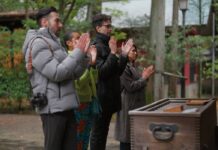Japan consistently ranks among the healthiest and longest-living nations in the world. This exceptional longevity isn’t a secret—it’s woven into the fabric of daily life through simple, centuries-old practices that prioritize balance and simplicity. Whether you’re an expat seeking a healthier routine or simply curious about the Japanese way of wellness, you’ll find that these habits are realistic, accessible, and deeply effective.
Forget restrictive diets and intense, modern workout regimens. Here are five core Japanese lifestyle habits you can adopt today to boost your physical health and mental clarity.
1. The Power of walking: Integrating Movement into Daily Life
In Japan, staying active isn’t a scheduled activity—it’s the default mode of transportation. The robust public transit system, combined with a high level of urban safety, naturally encourages a culture of walking.
Many people easily accumulate 8,000–10,000 steps a day simply by commuting, running errands, or meeting friends. The journey between train stations and destinations often replaces the need for an intensive gym session. This consistent, low-impact movement is scientifically proven to improve cardiovascular health and sustain muscle mass over the long term.
Action Tip: Embrace the walk. Instead of seeking the nearest exit or bus stop, choose the longer, scenic route when possible.
2. Beyond Sushi: The Balanced Art of Japanese Eating (Washoku)
The philosophy behind traditional Japanese eating (Washoku 和食) is simple: balance, variety, and mindfulness. This approach is a pillar of Japanese longevity. Washoku typically follows the rule of Ichijū Sansai (一汁三菜), or “one soup and three dishes,” ensuring a high intake of vegetables, lean protein (fish/tofu), and fermented foods.
Key Components of the Japanese Diet
- Small Portions, Big Variety
Meals are served on several small plates, promoting portion control and ensuring a wide range of nutrients in every sitting. - The Power of Fermentation
Staples like miso, natto, and pickled vegetables are essential. These foods are rich in beneficial gut bacteria, supporting digestion and immunity. - Emphasis on Natural Flavors
Ingredients are lightly seasoned to highlight their natural taste, reducing the need for excess salt, sugar, and oil.
The Konbini Shortcut
Even if you can’t cook, Japan’s famed convenience stores (konbini コンビニ) offer surprisingly healthy options adhering to these principles.
- Plain Onigiri (Rice Balls)
Choose simple fillings like ume (pickled plum) or grilled salmon over heavily seasoned options. - Tofu & Edamame
Excellent plant-based protein sources, often ready-to-eat. - Seaweed & Miso Soup
Quick ways to consume essential minerals and fiber. - Unsweetened Teas
Green tea and barley tea are the default, hydrating alternatives to sugary drinks.
3. Healing in the Forest: Practicing Shinrin-Yoku and Nature Therapy
The Japanese appreciation for nature goes beyond sightseeing; it is a therapeutic practice known as shinrin-yoku (森林浴), or forest bathing. This is not strenuous hiking, but simply being present and mindful in a forest setting, engaging your five senses.
The Proven Benefits
Research shows that shinrin-yoku can significantly lower the stress hormone cortisol, reduce blood pressure, and boost the activity of natural killer (NK) cells, which support the immune system. Even in metropolitan areas, seek out:
- Local Parks and Shrines
Use these pockets of green for brief moments of escape. - Zen Gardens
These meticulously maintained spaces encourage quiet contemplation and visual stillness.
Action Tip: Leave your phone in your pocket. Focus on the scent of the trees, the sound of the leaves, and the feeling of the air. This simple act of presence is a potent mental reset and a core aspect of Japanese mindfulness.
4. The Deep Soak: Onsen and Sento for Physical and Mental Restoration
The culture of onsen (温泉, hot springs) and sento (銭湯, public bathhouses) is a beloved part of daily life, and for good reason. They are vital tools for recovery and stress relief.
Beyond Relaxation
A warm soak after a long day helps relax muscles, alleviate pain, and significantly improve blood circulation. Furthermore, the practice is a powerful tool for better sleep. The drop in body temperature after leaving a hot bath signals the body that it’s time to rest, promoting deeper, more restorative sleep.
Action Tip: If you have access to an onsen or sento, take advantage of the healing mineral waters. If not, simply turn your nightly bath or shower into a mindful, warm-water ritual.
5. The Zen of Cleanliness: How Decluttering Leads to Mental Clarity
Japanese homes and public places are often characterized by a cultural emphasis on cleanliness, order, and minimalism. This goes beyond aesthetics; it’s a practice that directly impacts mental wellness.
Maintaining a clean and uncluttered space helps reduce mental clutter, anxiety, and overwhelm. Concepts like Danshari (断捨離, decluttering) and the global phenomenon inspired by Marie Kondo emphasize that external order fosters internal calm and focus.
Action Tip: The “One-Minute Rule”: Try to adopt this simple principle: If something takes less than one minute to tidy, put away, or clean, do it immediately. This prevents small tasks from piling up and reduces the overall mental load of a “messy” environment.
The Philosophy of Ikigai and Simple Balance
Ultimately, Japanese wellness is less about chasing trends and more about embracing a holistic, sustainable approach to life. The core concept of Ikigai (生きがい) – your “reason for being” – provides a powerful framework for mental health, giving purpose to your daily actions and contributing to a sense of community.
You don’t need to adopt every single habit overnight. Even one or two of these changes can make a real difference in how you feel, both physically and mentally. Healthy living in Japan is about balance, simplicity, and finding joy in the little, consistent things.
Which of these powerful habits will you try first to uncover your own path to longevity?
Subscribe to the Tech Journey Japan Newsletter
Stay updated with new job opportunities, articles, and occasional news about hiring foreign talent in Japan!














